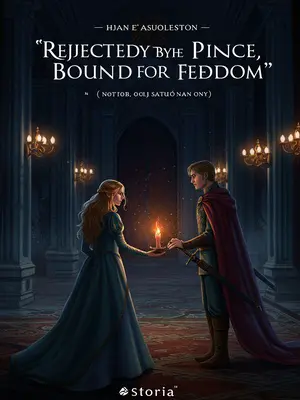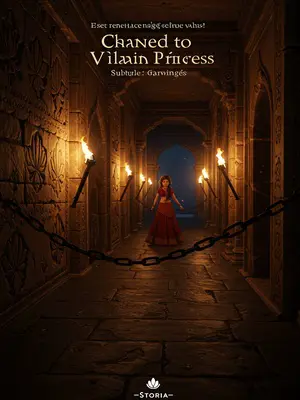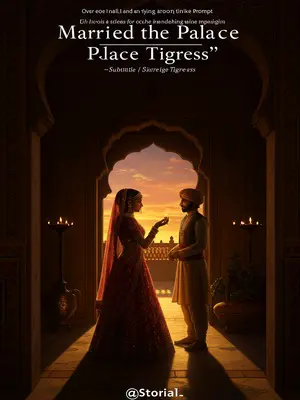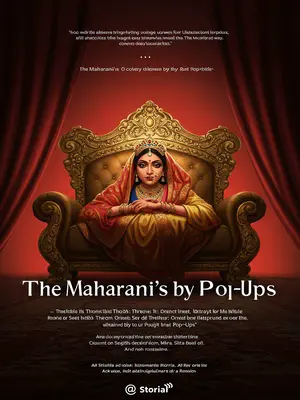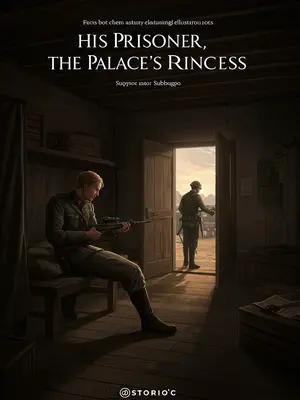Chapter 7: Surya Mahal and Rebellion’s Dawn
It was the first time the madam of Surya Mahal had seen someone bring a lady to a kotha.
She hurried forward, her heavy anklets jingling, face pinched with worry. The tawaifs behind her tittered, peeking at us from behind silk curtains.
For a moment, her face soured, worried we were there to create a scene.
She wrung her hands, bowing low. "Hukum, let me bring sharbat for your lady."
I clung to Kabir’s arm, feeling both embarrassed and awkward.
My cheeks burned as I tried not to meet anyone’s eyes. I gripped Kabir’s kurta, half-hiding behind him.
No wonder it was the liveliest place—it turned out to be a pleasure house.
The air was thick with rose attar, tabla beats, and the clink of glass bangles as dancers spun. The floors were scattered with rose petals, laughter and the twang of sitar from deeper inside.
Seeing my curious, darting eyes, Kabir confidently led me inside.
He winked at me. "Let’s see what all the fuss is about."
“Ahem, this young Raja and his lady are here just for the fun. Please see that my two companions are well entertained.”
He grinned at the madam, handing her a gold coin. She bobbed her head, relief blooming on her face.
I was amused.
I stifled a giggle behind my palm, watching the scene unfold.
Kabir never hesitated to put his friends on the spot.
He nudged them forward, winking.
The two young men with him were his study companions.
One, Aman, always so proper, adjusted his collar nervously. The other, Ravi, swaggered a little, trying to look braver than he felt.
One, immaculate and from an aristocratic family, valued his reputation above all.
Aman’s face was red as a tomato, sweat glistening on his brow.
The other, dashing and unruly, was a retired colonel’s only son and the most rebellious.
Ravi twirled his moustache, cracking jokes to hide his discomfort.
It was likely their first time in such a place as well. Seeing their flushed faces, I laughed so hard I collapsed into Kabir’s arms.
I couldn’t help myself, my laughter bubbling up uncontrollably. Kabir steadied me, trying to hide his own smile.
“Don’t laugh at others.”
He whispered in my ear, but his lips twitched at the corners.
I blinked, not understanding his sternness.
I pouted at him, mouthing, "Sorry."
After arranging for his friends, Kabir ignored them and took me to a private room.
He led me up a winding staircase, away from the noise. The madam bowed again, offering us a tray of sweets.
The entire building was filled with alluring beauties.
Each woman was more graceful than the last—draped in silks, their laughter ringing like bells.
Silk curtains, golden lamps, the air heavy with the scent of jasmine.
A single lamp flickered on a silver stand. The heady fragrance made me dizzy.
Kabir seemed especially cheerful today, coaxing me to drink a few cups of rose sherbet while he himself got drunk.
He raised his glass, toasting to my smile. "Ek aur muskurahat dikha do, Shreya. Sirf mere liye."
He brushed my cheek, his gaze lingering. I felt my worries melt away, just for a moment.
I was always grateful that Kabir looked nothing like His Highness.
He had our mother’s nose, our father’s mouth, but none of the Maharaj’s harshness.
So I could lose myself in the passion he gave me without restraint.
With Kabir, I felt alive, not just surviving.
It was only natural to forget my identity, to forget my hatred for my lost country.
In those moments, the palace, the pain, the past—all vanished.
I heard he greatly resembled the late Maharani, with a face as serene as a Devi’s idol.
Some said the goddess herself blessed him with her grace.
So I devoutly kissed those crimson lips.
It felt like darshan at a holy shrine, a desperate prayer.
As if in prayer, as if in atonement.
I pressed my lips to his, silently begging for forgiveness—from my father, from my lost brothers, from the child I once was.
Late at night, I dragged my tired body and knocked on the door of a plain guest room in Surya Mahal.
The corridor was silent, save for the soft rustle of my sari. I paused, steadying my breath, clutching the talisman in my fist.
By the dim diya light, I counted each person present.
Shadows flickered on the wall. Some faces were familiar, others I only knew from old stories.
Father left me an army.
His legacy was not only sorrow, but a hidden strength waiting for my command.
The talisman he gave me could command fifty thousand royal guards.
I fingered it, heart pounding. Its weight was heavier tonight.
Even my mother did not know of this army.
I had learned to keep secrets—especially from her.
These people were the last loyalists of Kaveripur.
Each bowed their heads to me, voices low, eyes shining with hope.
After Father’s death, some went into hiding, some retired, vowing never to serve the new dynasty.
Some became fakirs, some ran away to the hills, but tonight, they all answered my call.
I hid in the Eastern Palace. Kabir treated me as fragile porcelain, always protecting but never restricting me.
He never asked where I went at night, trusting me with a faith I did not deserve.
So I took the opportunity to search for Father’s old spies. With a hundred years of southern foundation, Father left many useful people and resources.
His old chief of intelligence found me, guiding me to hidden allies, passing secret messages through the bazaar.
And as the princess of Kaveripur, I could gather them under my banner.
For the first time in years, I felt powerful, not powerless.
A few days ago, upon learning that the Crown Prince would inspect Rajpur, I sent out secret messages.
I disguised my handwriting, sent coded notes hidden inside betel leaves, trusting my loyal maidens.
Inviting these people to meet at Surya Mahal in Rajpur.
It was risky, but I was desperate.
Fortunately, they all came.
One by one, they slipped into the room, eyes wary but hearts determined.
“We greet the princess.”
Their voices rose in unison. For a moment, I saw Kaveripur in its glory days.
I gazed at the flickering diya and at the people bowing before me, then touched my forehead and then my heart, as if blessing them before I spoke.
My voice cracked but held firm. "I have only one question: Will you follow a Maharani?"
“I ask only one thing: Are you willing to support a Maharani?”
The silence was heavy. I saw surprise, awe, fear, and finally, resolve.
They must have been shocked.
The mute princess was no longer mute.
After all, rumour had it that Princess Shreya was mute.
I saw the disbelief in their eyes, but also hope. They waited.
But I was not mute; I simply did not wish to speak.
I stared at the diya, letting my words settle in the shadows.
I did not want to call another man ‘Pitaji Maharaj.’
The word choked me. Only my real father deserved that name.
My own father was so good.
His smile was sunlight, his embrace warm and safe. I would never forget.
How could I acknowledge a traitor as father?
I spat out the thought like poison.
“By the gods, only the princess remains of the southern royal bloodline. We are willing to follow you, restore our land, and never regret it, even unto death.”
They knelt, swearing oaths on their swords and their ancestors’ ashes.
Good. As long as you are willing.
I felt tears sting my eyes, but I held them back.
“Then all of you, enter the court, move slowly and surely, and quietly build your strength. Three years from now, we will act in Rajpur. Before then, each of you must establish your own power.”
I mapped out my plan, each step deliberate. My voice gained strength as I spoke.
“We obey the princess’s command.”
Their loyalty rang in the room like a temple bell. But outside, the city’s shadows were already shifting. Not everyone would remain loyal.





